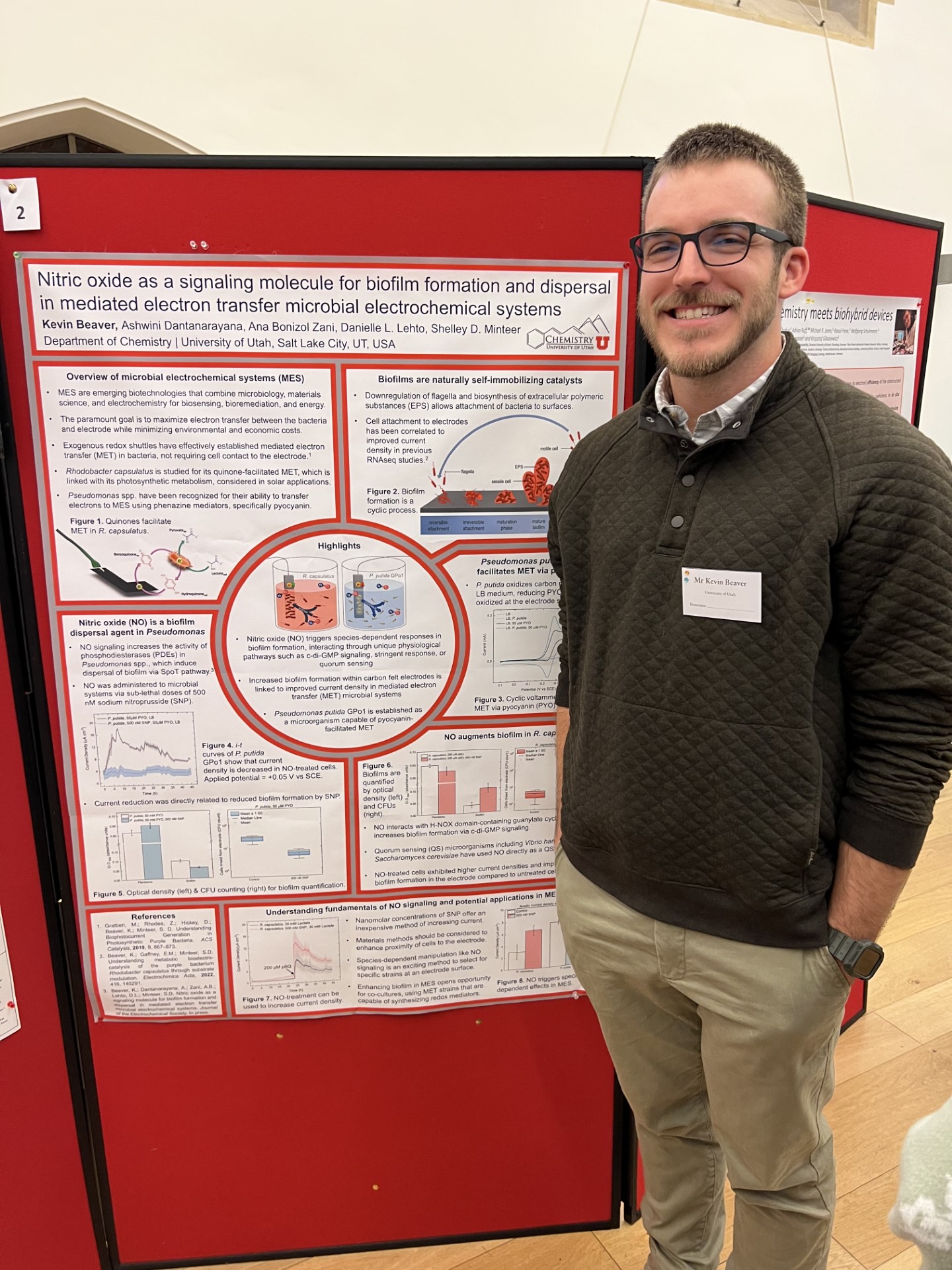Outstanding Grad Student Kevin Beaver
Tell us a little bit about you, what motivates and inspires you? 
As it relates to me as a chemist, my inspiration and motivations have always stemmed
from nature and the environment. I grew up in rural Pennsylvania, exploring and playing
in the woods, waterways and wetlands. I then went on to obtain my undergraduate degree
in environmental science, taking advantage of several different research experiences
spanning from plant genetics and enzyme kinetics, all the way to electrochemistry.
Why did you choose the University of Utah Department of Chemistry?
I first heard of the U of U Department of Chemistry because Prof. Shelley Minteer
gave a seminar at my undergraduate institution (Lebanon Valley College, Annville PA)
where I got to have some conversations with her about her lab's research. The following
summer, I took part in the Research Experience for Undergraduates (REU) program working
in the Minteer lab, and I had the best time. Utah was definitely at the top of my
list when I was applying for graduate schools, and once I got the offer, I never looked
back. Utah also offers really interesting environmental extremes, specifically the
Great Salt Lake, which is home to a novel species of bacteria that I had the opportunity
to study.
Is there something that you will never forget from your Utah grad school experience?
Something I was not necessarily expecting from graduate school but am very grateful
for was the cultural experiences that came with it. Through my diverse lab, I have
made friends from more countries than I could count, and I have learned so much about
their homelands. I also had the opportunity to travel to three international conferences
and present my research, meeting so many cool people along the way.
Do you have a favorite Professor(s) in Chemistry? If so, how did they impact your education at the U?
Along with my wonderful advisor Prof. Shelley Minteer, Prof. Henry White has been
vital to my success as I transitioned into electroanalytical chemistry from a very
biological background. In addition, Prof. Aaron Puri has been a very special mentor
to me throughout my graduate school studies, and he is an exemplary research advisor
with whom I enjoyed collaborating during my PhD.
Is there something in current events or the forefront of technology that has caught your attention? Latest chemistry innovations?
The short answer is "all of it". Staying on top of new literature has been my favorite
part of being a scientist. I wouldn't be motivated to do research if there were not
fascinating scientific breakthroughs every day to look forward to. As I move on to
my next chapter after graduating, I will be an Innovation Fellow at the Defense Science
Office at DARPA. It will be my responsibility to grow and lead the next generation
of cutting edge topics in research, even expanding outside of chemistry.
What aspects of chemistry are fascinating to you?
My field in chemistry involves everything at the interface of electrochemistry and
microbiology, which is a larger overlap than a lot of people may realize. That said,
the field is pretty niche and brings in a lot of interdisciplinary approaches from
biology and engineering. With microbial electrochemistry, we can use bacteria to degrade
waste products and produce renewable energy. On the flip side, we can stimulate microbes
with electricity to reduce atmospheric carbon dioxide or produce useful chemical products.
One of my favorite graduate school projects used electro-active Great Salt Lake bacteria
(Salinivibrio sp. EAGSL) in a fuel cell to produce power while synthesizing the valuable cosmetic product
ectoine.
What is the biggest challenge today for being a Chemist?What advice do you have for incoming students?
In recent years, science is moving more quickly than ever. It is really important
to stay in the know. If you aren't ahead, you're behind. My advice to incoming students
would be to make a huge effort to stay on top of the literature so you are never wasting
time, reinventing the wheel. You also never know where in the literature you might
find a bit of inspiration for a new project. Also, something I wish I would have done
was to incorporate more programming and coding into my research. Almost all industrial
companies are now strongly requesting coding competency for chemist hires.
Do you have any future plans in the field of Chemistry? Is there anything else you would like us to know?
For whatever comes after my time at DARPA, I am certain chemistry will be a huge part
of it. It may be in the distant future, but I have always dreamed of starting my own
company. I would love to incorporate my background in microbial electrochemistry to
make the company as sustainable as possible by targeting waste streams and producing
renewable energy. As to what exactly this company will do, only time will tell. It
is very possible that the problem I will be trying to solve might not even be a problem
today, and that is what chemistry is all about.
